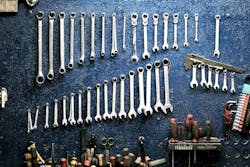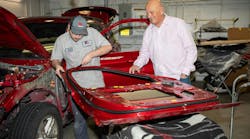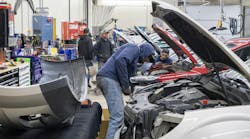At the Indianapolis Collision Industry Conference (CIC) meeting in July, Roxann Griffith looked out at a room full of hundreds of collision repair shop operators, OE representatives, suppliers and consultants, and asked, “How many of you use your state’s workforce system?”
Not one person in attendance raised his or her hand.
The U.S. Department of Labor, of which Griffith is the regional veteran’s employment coordinator, estimates that, by 2026, there will be more than 1.2 million job openings in the transportation sector.
While demand for skilled automotive technicians has never been greater according to the Universal Technical Institute (UTI), shops surveyed at the meeting were not using a free, easily accessible government resource to find employees.
“It’s critical that students and families understand the outstanding career opportunities that wait in the transportation field,” says Jerome Grant, chief operating officer at the Universal Technical Institute.
To work to fill this skills gap, UTI has launched an early employment initiative that combines post-secondary skills education with on-the-job, apprenticeship-type training. In the program, students learn about, and can apply for, local jobs with participating employers as soon as they enroll at UTI’s Avondale, Ariz., campus. The program’s employers have the opportunity to screen and hire incoming students before they start school and give them on-the-job experience while they complete their education.
Of course, UTI is not alone in its efforts to close the skills gap in the automotive industry. At CIC, Griffith provided insight into how a collision repair shop can utilize another type of worker: a U.S. veteran.
The Department of Labor’s HireVets program is connected with over 4,000 employers in the U.S., says Mark Toal, the national veteran’s employment manager for the Veteran’s Employment and Training Service (VETS).
There are over 30 early employment positions available to incoming students this fall through UTI’s program. UTI plans to start the program in Arizona and take it national to 12 campuses across the country.
Yet, while solutions to lessen the skills gap are available, shops need to know about available resources before signing on. Not only can leveraging the unemployed veterans help the technician shortage but it can also potentially bring money back to the shop in some cases in the form of tax credits and awards.
Incorporating On-the-Job Training
Once students enroll in the program, they can apply for a job with a participating transportation employer, Grant says.
Students that advance through the hiring process work directly with the employer. Through this program, they’ll learn the culture of their prospective company and position themselves in careers while receiving UTI training.
Graduates who complete a UTI education and meet the employer’s criteria have the opportunity to get all or a portion of their educational expenses reimbursed, as well as an offer for full-time employment.
The median age of a veteran is 65 years old, with 60 percent of all veterans over the age of 45 years old, Toal notes.
Toal has often heard that a challenge for hiring veterans is that they don’t possess the specific skill-set for which employers are looking. So, he recommends a shop incorporate a training program into its facility.
He says the employer can partner with a local community college or vocational school in order to get the veteran the skills he or she needs. Another option is for the veteran to work part-time at the shop while learning industry-specific skills.
Using Regional and National Resources
A body shop should advertise that it’s a veteran-ready facility and not just a veteran-friendly facility, say the aforementioned experts. A veteran-friendly facility can advertise that it welcomes all veterans, but a veteran-ready facility means that it not only hires veterans, but also retains them, Toal says.
By going online to hirevets.gov, collision repairers can find American Job Centers with whom they can partner. This is free for the business to do and there are roughly 2,400 such centers across the country.
“It’s important to be focused on meaningful employment and retaining that employee by offering job benefits like a competitive wage and more,” Toal says.
If the body shop contacts a government representative like Toal or Griffith, they can also help facilitate a relationship between the shop and organizations like Soldier for Life, Marine for Life and the National Guard and Reserve. Through these resources, shops can often post job openings for free on websites, and go to the sites and set up job fairs for free.
Leveraging Skills for a Long-Term Career
Veterans can offer a variety of soft skills that other job applicants might not have, Toal says. Like Toal, who was in the Marine Corps for 28 years, many veterans come into new jobs with a varied set of skills and training from the military.
For instance, some soft skills they can contribute to the body shop include teamwork, an ability to work on diverse teams, and an ability to handle ample responsibility. Plus, veterans are typically able to stick to a schedule and meet deadlines, experts say.
Griffith said during CIC that, if an employer hires a veteran and lays out their role and how it fits into a longer career path for the individual, the employer is more likely to retain that veteran for years.



